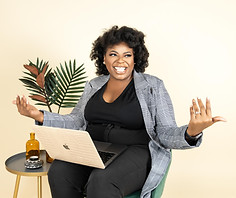What does Black History Month mean to kids?
- Shakinah Simeona-Lee

- Feb 4, 2022
- 4 min read
Aye Aye… Idk what y’all do in your house, but Black History Month is an extra special time in our year where we have the opportunity, permission, and space to be blackity black black. Yes, yes, this is definitely a blog about supporting moms, giving encouragement, real pieces and moments of life, but I would be remiss if I did not speak on and create the moment for one of my most salient identities… my blackness.

As you can see, through the myriad of pictures on this site, we are a black family. In a time where blackness and black families have invisible targets, I feel it is my purpose to be the voice, proof, and maybe example of what it can be. I believe in creating the space of vulnerability as a mom, a professional, a wife, and an imperfect woman.

So with all of this you can imagine how when my 5 year old daughter asked, “mommy, what’s black history month?” I needed to explain on her level (again), what black history month is and why we celebrate. I remember explaining this to her last year and being intentional about it not centering black trauma, but rather, black excellence and accomplishments.
I will say, it is hard to talk about how important BHM is without giving some level of context of resilience that black people are forced to have/develop to become a part of history. Why being the first black person to win an Olympic game, create genres and styles of music, or become president of the United States is important.
My daughter’s question comes with many nuances around race, blackness, self-identity and understanding.
I recently was on a podcast (Karissa Knows It) where we talked about, “How to Talk to Your Child About Race.” The podcast is amazing so I definitely suggest you go tune in! Among the many questions we were asked, I think one stuck out to me the most.

Does your child know that they are black?
For the moms with children with other or multiple identities of course the question and responses were different. For me, raising two black daughters, I had to sit with the duality they will live in and experience while preparing them for what’s ahead.
I’ve included some tips and things I’ve done for my young children to grow an appreciation for Black History or any other History month.
Know your child
If you have a young child like me, I try to make things relatable and fun. Naomi loves gymnastics and literally cartwheels up and down our hallways. I started exposing her to amazing black gymnasts who’ve broken records and were the “first” to do it. Here is a video of me talking about the amazing Dominique Dawes.
Push through the challenging conversation
Most recently I read a book to Naomi about Ruby Bridges, the little girl who was taunted going to an all-white school during integration. As Naomi always does she starts asking questions: Why didn’t they want her to go to the same school? Why didn’t they like her? I don’t get it- that’s not nice!….. then the tears started to fill her big eyes. As her mom I had to push through 😩
I explained the ignorance and the hate people have in their heart. I explained that as her mom, I’m teaching her to be nice. Those people and their parents were taught to hate others because of their skin. They are the ones who miss out because they aren’t taught to love everyone and they are missing out on a lot of different types of friends.
Not that I feel that this is a perfect response, but I think for her age and her awareness of her blackness, this is simple and centers the fault of the offender/oppressor.
Exposure
Whether you have a Black child like me or are raising one to be actively aware of others around them, I strongly believe exposure to other groups, cultures, and identities help. My daughters have mostly black, and a couple of brown, doctors and specialists. I feel like those are areas I can most easily control and create a narrative of excellence.
If there is a cultural event going on in our city (we are fortunate enough to live in a diverse city) we go as a family - we talk about what we saw and may connect it to a book or food that we will eat in the future.
Integrate it into your lifestyle
We read to the girls every night, and half of their books center black characters. They see their skin, their hair, their culture in the pictures of the books.
Some books we are reading now are “I am Enough” by Grace Byers and “Dancing in the Wings” by Debbie Allen.
Never stop learning
You never want to be in a place where you think you know or have “mastered it all.” You, me, the one orator and influencer with a million followers or a billion degrees can never think or imagine what mastering all of the nuances of race is - it’s impossible. Always be a student. Most importantly, always approach concepts from that of a child, so you can explain it in ways they can understand and relate!
Love y’all! ✊🏽













Comments